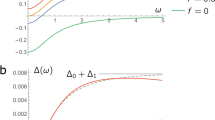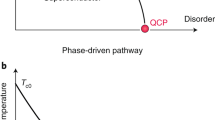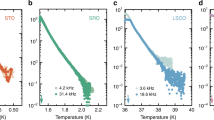Abstract
IT is a controversial question whether the phenomenon of superconductivity is merely a consequence of the quantum theory of interaction among electrons or whether it depends on the specific crystal structures. The first point of view is taken in Heisenberg‘s theory1. However, it can be shown by general reasoning that if the ionic forces between ions and electrons are disregarded, all states with a total current different from zero will have higher energy than those without. Moreover, there is a strict isomorphic correspondence between all states without current and all states with a given current. Consequently the free energy of the states with a current cannot be the smallest at any temperature. Secondly, Heisenberg‘s theory predicts the existence of superconductivity in all metals, including the alkali metals ; yet so far experimental evidence does not confirm this.
This is a preview of subscription content, access via your institution
Access options
Subscribe to this journal
Receive 51 print issues and online access
$199.00 per year
only $3.90 per issue
Buy this article
- Purchase on Springer Link
- Instant access to full article PDF
Prices may be subject to local taxes which are calculated during checkout
Similar content being viewed by others
References
Heisenberg, W., Z. Naturforsch., II a, 185 (1947).
Seitz, "Modern Theory of Solids", 365.
Fröhlich, H., and Mott, N. F., Proc. Roy. Soc., A, 171, 496 (1939).
Kok, Physica, 1, 1103 (1934).
Author information
Authors and Affiliations
Rights and permissions
About this article
Cite this article
BORN, M., CHENG, K. Theory of Superconductivity. Nature 161, 968–969 (1948). https://doi.org/10.1038/161968a0
Issue Date:
DOI: https://doi.org/10.1038/161968a0
This article is cited by
-
Meissner Effect, Spin Meissner Effect and Charge Expulsion in Superconductors
Journal of Superconductivity and Novel Magnetism (2013)
-
Theory of Superconductivity
Nature (1949)
Comments
By submitting a comment you agree to abide by our Terms and Community Guidelines. If you find something abusive or that does not comply with our terms or guidelines please flag it as inappropriate.



